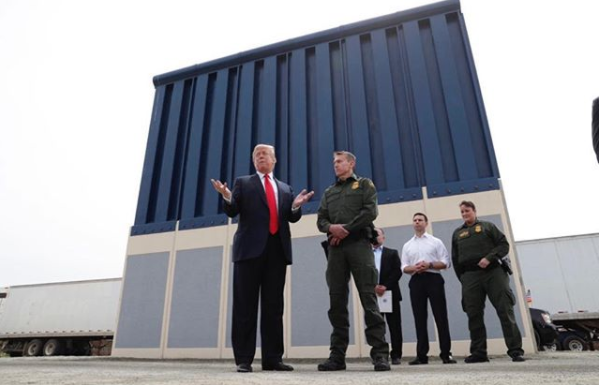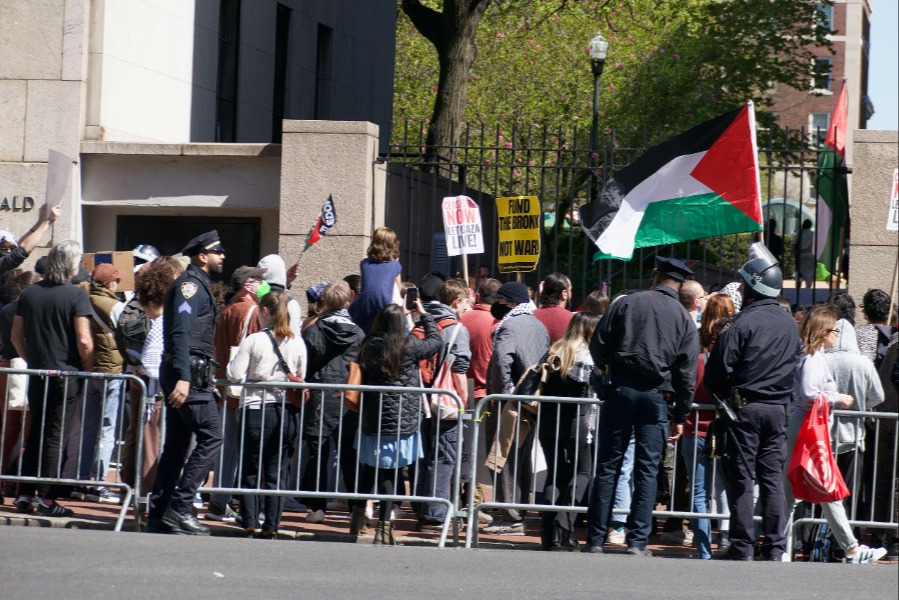Everyone Calm Down About That Declaration of National Emergency
Stuck with a government shutdown, President Trump and his advisors are reportedly considering the invocation of emergency authorities in order to begin construction of a wall along the U.S.-Mexico border. The president stopped short of making such an announcement in his address to the country on Tuesday night. But according to Axios, a declaration of emergency “remains the most likely ultimate option.”

Published by The Lawfare Institute
in Cooperation With

Stuck with a government shutdown, President Trump and his advisors are reportedly considering the invocation of emergency authorities in order to begin construction of a wall along the U.S.-Mexico border. The president stopped short of making such an announcement in his address to the country on Tuesday night. But according to Axios, a declaration of emergency “remains the most likely ultimate option.”
The hitch, Axios writes, is that “conservatives … don’t like what they view as an abuse of this authority.” And indeed, reports that Trump might make such a declaration has sparked fears of authoritarian takeover by a president who wears his authoritarian impulses on his sleeve. “When I hear the words ‘national emergency’ or ‘state of emergency,’” said host Tommy Vietor on the center-left podcast Pod Save America, “it makes me think of [President Recep Tayyip] Erdogan in Turkey or President [Abdel Fatta al-] Sisi in Egypt, authoritarians who lock down civil liberties in the name of some security threat.” Interviewing my colleague Benjamin Wittes on a center-right podcast, anti-Trump conservative Charlie Sykes similarly mused, “If the president [declared a national emergency to build a wall], that would be a crisis, wouldn’t it? We’d be talking about the rule of law.”
It’s true, as Vietor says, that the term “national emergency” conjures a mood of worst-case scenarios. On a theoretical level, it evokes the work of the prewar German legal scholar Carl Schmitt, who became famous—or infamous—for his theory of emergency authority, which he summarized tersely as, “Sovereign is he who decides on the exception.” Schmitt, who went on to align himself with the Nazi Party, argued that even the most highly-regulated legal system inevitably provides space for the sovereign authority to act in a “state of exception” outside of law. He enjoyed a new vogue in the years after Sept. 11 as a kind of demonic prophet who had seen the possibility for dictatorship in the heart of law—and I’ve written at length about Schmitt’s theory of the state of exception as a framework for understanding the Trump administration.
So this advice on this subject may be counterintuitive coming from this author—but for whatever it’s worth, I don’t think people should be panicking about the declaration of a national emergency for wall-building purposes.
A presidential declaration of emergency in order to construct a wall would be stupid. It would be wasteful. It would test the limits of the president’s authority under the law in question. And it would play to the bleakest, ugliest elements of the American character. But it would not, in itself, be a step toward authoritarianism.
The idea of a state of emergency evokes Schmitt in part because it suggests unilateral presidential power—the president as Schmitt’s sovereign, acting without restraint or guidance from the other branches of government. Much of the commentary around on Trump’s proposed national emergency has focused on the framework set out in Justice Robert Jackson’s deservedly famous concurrence in Youngstown Sheet & Tube Co. v. Sawyer, in which Jackson sketched three categories of presidential power: the first, in which the president acts pursuant to both Article II authority and authority provided by Congress; the second, a “zone of twilight” in which Congress has failed to speak; and the third, the “lowest ebb,” in which the president seeks to exert authority despite congressional disapproval. Reading Jackson alongside Schmitt, the second and third tiers are the space in which the state of exception might seep in: the president acts on his or her own, or mostly so, in shaping the surrounding world. “Presidential claim to a power at once so conclusive and preclusive must be scrutinized with caution,” Jackson writes of the “lowest ebb,” “for what is at stake is the equilibrium established by our constitutional system.”
Writing in Bloomberg, Noah Feldman argues, “Congress has been even clearer about not appropriating money for Trump’s border wall than it was about not allowing Truman’s seizure of the steel plants”—the action at issue in Youngstown, which Jackson argued lay at the “lowest ebb.” If Trump were planning to declare a state of emergency requiring the construction of a border wall based on his Article II authority alone, the equilibrium that Jackson describes would indeed be at stake. But there’s no evidence that this legal argument is what the White House has in mind. What the president appears to be planning instead is decidedly not Schmittian.
Writing on Lawfare, both Robert Chesney and Margaret Taylor have taken a look at the legal authority under which Trump might, as he has threatened, build a wall pursuant to a declared state of emergency. There is much that remains unclear about what legal arguments the White House might have in mind, but the most likely culprits are 10 U.S.C. § 2808(a) and 33 U.S.C. § 2293. Section 2808(a) allows the secretary of defense to “undertake military construction projects … not otherwise authorized by law, that are necessary to support … use of the armed forces”—though the construction may only be funded by money that has already been appropriated for military construction, though not yet obligated to any specific projects. Section 2293 allows resources to be diverted from existing Army civil works projects to “authorized civil works, military construction, and civil defense projects that are essential to the national defense.” Both statutes require a declaration of a national emergency “that requires use of the armed forces” under the 1976 National Emergencies Act.
Crucially, the National Emergencies Act places no restraints on what a president may declare as an emergency. This may well prove to be important in any litigation against a potential wall, as plaintiffs attempt to convince the courts to set aside their usual deference to executive determinations on national security. The administration, after all, has failed to provide any credible evidence of any real “emergency” at the U.S.-Mexico border, much less one “requir[ing] use of the armed forces.” This problem may lie behind the apparent hesitation at actually pulling the trigger on the declaration.
There is a sense in which this feature of the statute is very Schmittian. According to Schmitt, one of the defining characteristics of the “exception” is that its contours cannot be defined by anyone except the sovereign itself, which is precisely what makes the state of exception so ominous: it can be invoked at any time and for any reason.
But the authorities provided by § 2808(a) or § 2293 are very far from the black hole at the heart of law that Schmitt imagines. To begin with, the requirement that the emergency in question mandate “use of the armed forces” sets at least some condition, if an easily satisfied one, on the authoritarian vision of boundless exception. More importantly, if the president were actually to declare a national emergency—or, as Taylor suggests, point to a previously-declared emergency—and invoke either or both statutes, he would not actually gain all that much new power. The president would be able to use as a piggy bank for wall construction money already appropriated by Congress for other Defense Department construction projects and Defense Department resources already allocated to Army civil works programs. Essentially, the ominously vast grant of emergency authority boils down to Trump’s ability to shuffle around resources the Pentagon already has. Notably, in order to use this power, he would have to take money away from existing projects.
So there is not a terrible argument that the president may really have statutory authority to build a wall pursuant to a declaration of national emergency. But the legal argument is not terrible in large part because the authorities at issue are relatively narrow. If the White House were to find the basis for emergency authority to build the wall in Article II, that claim would sweep much more widely—and would be much more troubling for onlookers worried about a slide toward authoritarianism.
Conversely and more than a little ironically, as alarming as any declaration of national emergency may sound, reliance on § 2808(a) or § 2293 would place Trump’s actions in Jackson’s first category in Youngstown—the least controversial. The administration would be making an argument that the president is acting within a statutory framework provided by Congress, rather than pointing to the kind of independent, unilateral authority that comes to mind when one hears the term “state of emergency.” This is not “sovereign is he who decides on the exception” but a president exercising power delegated to him by a co-equal branch of government consistent with the structure of separation of powers—and likewise subject to review in litigation by another co-equal branch of government.
None of this is an endorsement of the current structure of emergency authority under the National Emergencies Act or of that statute’s open-ended definition of what constitutes an emergency in the first place, especially in the hands of an administration untethered from the facts. The Brennan Center has compiled the many statutory powers that become available to the president upon a declaration of emergency; a decision by Trump to invoke § 2808(a) or § 2293 does not foreclose a future invocation of other emergency statutory authorities, though under the National Emergencies Act he would need to specify to the public which powers he plans to use.
The current anxiety may actually be a case of what Jack Goldsmith has described in the Trump context as “libertarian panic”: that is, the president has so far failed to realize his most authoritarian impulses in part because of the surge of outrage that often erupts when Trump attempts to curtail civil liberties or encroach on the rule of law. This dynamic is not exactly a sign of a healthy democracy. Neither is an invocation of national emergency in the absence of an actual emergency, in order to build a wall that there is no factually compelling reason to construct. But if the constitutional order is ailing, a wall built on the basis of national emergency brings it no closer to death. And it is a sign of the strange place in which the United States finds itself that this should actually be at least somewhat reassuring.





